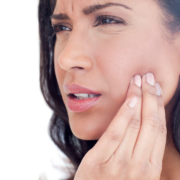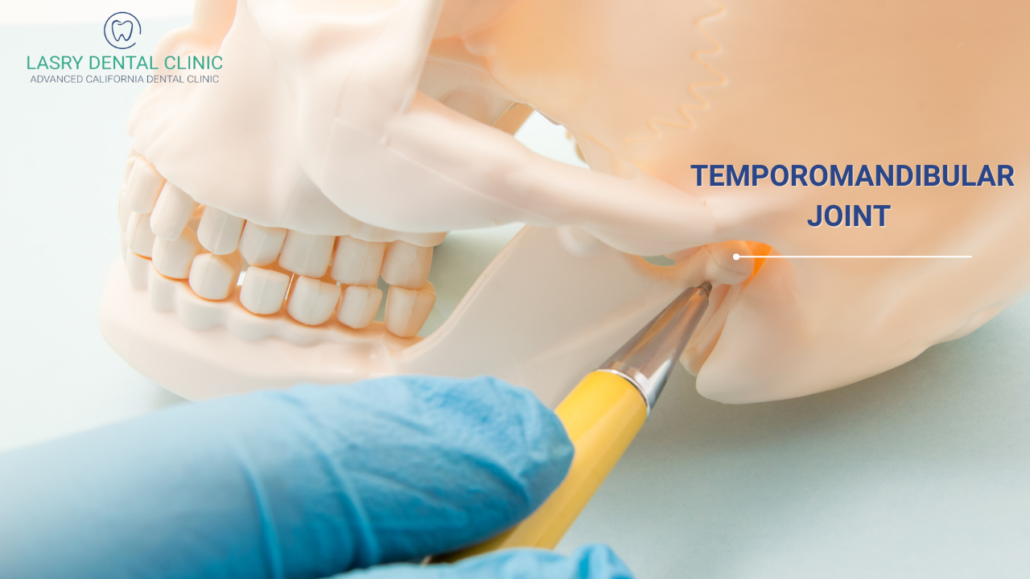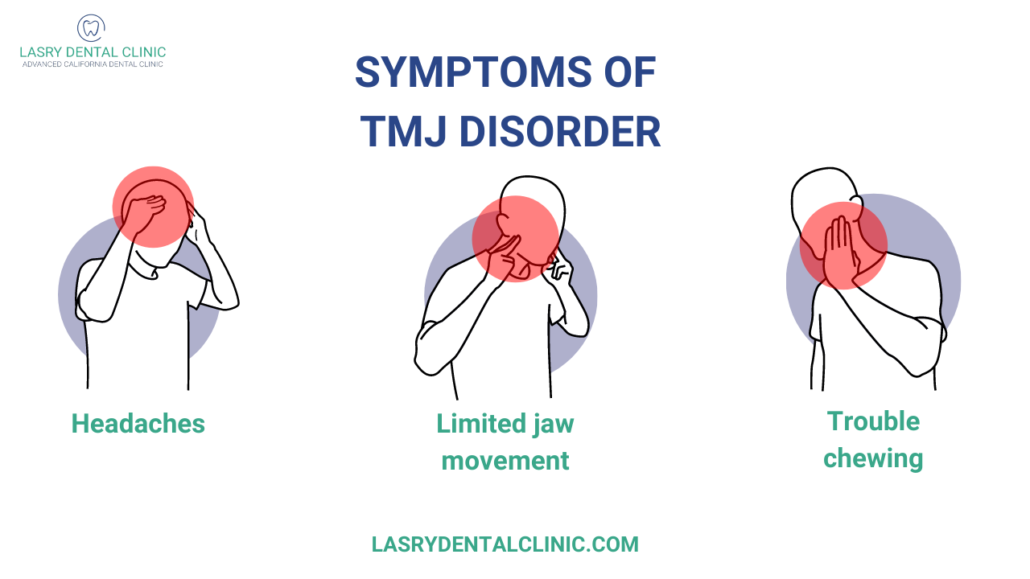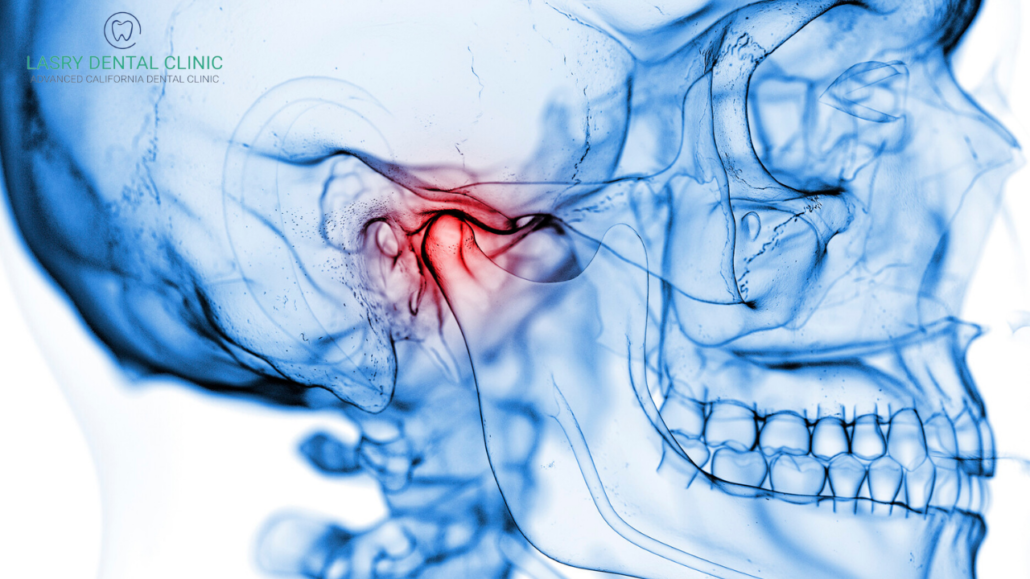How To Permanently Cure TMJ and Relieve Pain
Suffering from pain in your jaw? You’re not alone. Jaw pain is widespread and can be excruciating. And if you suspect you have TMJ (temporomandibular joint) disorder, there’s no doubt that you want to figure out how to cure TMJ permanently.
The temporomandibular joint is responsible for facial muscle movement, like smiling or chewing. This joint connects the skull to the lower jaw. We often refer to the lower jaw as the temporal bone, located right in front of the ear.
A TMJ disorder occurs when that joint isn’t working correctly. The most telltale sign that you have this is if you feel pain and discomfort coming from the bone right below your temple.
RELATED: WHAT ARE THE SYMPTOMS OF A TOOTHACHE?
What is TMJ?
The temporomandibular joint, or the TMJ, connects your skull to your lower jaw. A disc separates the two sections that consist of TMJ.
This disc absorbs the shock to the joints caused by jaw movements such as chewing and smiling. With the help of surrounding joints and muscles, this system allows the jaw to move from left to right and up and down.
TMJ disorders are a group of conditions that occur when something doesn’t allow this system to work correctly. This causes pain, discomfort, and more.
According to the National Institute of Dental and Craniofacial Research, TMJ disorders are very common. They estimate that around 10 million Americans are affected by them.
Signs of TMJ
So, who is affected by TMJ disorders? In some cases, TMJ is genetic, while other times, they’re caused by issues such as arthritis or trauma to the area.
TMJ pain is also sometimes seen in people who constantly clench their jaw or grind their teeth. This disorder also seems to affect women more than it affects men.
Some signs of TMJ include:
- Pain or discomfort in or around the jaw, ears, temples, neck, face, or jaw muscles
- Headaches
- Limited jaw movement
- Locking of the joint
- Trouble chewing
- Ear problems, such as pain or sensitivity to wind and noise
- Painful clicks or pops when moving the jaw
When you think of TMJ disorder, you may only consider issues involving the jaw. But the overall reduction in your quality of life is another symptom— one that may lead to other problems, such as insomnia, depression, or anxiety.
Eventually, TMJ may become severe and require surgery, so it’s best to take the steps necessary to cure TMJ permanently.
RELATED: INVISALIGN IN LOS ANGELES: DO YOU REALLY NEED IT?
How To Cure TMJ Permanently
If you’ve been dealing with the pain and discomfort of TMJ, there’s no doubt that you’re probably looking for methods on how to cure TMJ.
In some cases, TMJ disappears on its own with no need for treatment. However, this isn’t very common. It’s best for you to seek medical help from a professional if you find that your daily activities are being interrupted by TMJ pain and symptoms.
You can also try these remedies at home for both relief and a permanent solution!
RELATED: ROOT CANAL PROCEDURE: WHAT TO EXPECT
Step 1: Get a 3D Dental Scan
To get diagnosed with TMJ, a dentist or TMJ specialist must do a thorough examination of your teeth, gums, and jaw.
To further inspect your jaw structure and teeth alignment, your dentist can do a 3D X-ray of your mouth. A 3D dental scan is used in some dentist offices to get a 360-degree view of your teeth and gums. It can even snap images of the tissues, nerves, and bone structure inside your mouth.
Since dentists have to tailor treatments to your specific symptoms and any underlying conditions, it’s crucial to have an accurate image of your jaw. Your treatment will be created specifically for you in a customized treatment plan.
Step 2: Fix Dental Problems
One of the most common causes of TMJ is disc displacement. Disc displacement occurs when the teeth or the jaw are misaligned. Disc displacement may develop if your teeth misalignment is because of issues such as overbite, crossbite, or underbite.
Thankfully, dentists can fix crossbites and underbites with orthodontic care. Braces or Invisalign work overtime to shift teeth to their proper placement. Once the teeth and jaw are in their proper position, TMJ symptoms that came to be because of misalignment may (hopefully!) disappear.
Other reconstructive work such as well as bridges and crowns may also cure TMJ.
Step 3: TMJ At-Home Care
If you’re trying to treat a TMJ flare-up, there are some methods you can try at home for relief. Doing these simple things may help you if you’re trying to find out how to cure TMJ permanently:
- Eat soft food: Eating soft foods allows your jaw to take a break from constantly chewing since they require less muscle movement.
- Try jaw exercises: Your dentist or specialist may provide you with exercises to perform daily. These will most likely help the most with curing TMJ.
- Apply a cold compress and moist heat: This will help reduce inflammation and pain, just make sure to take a break after 15 minutes.
- Over-the-counter medications: For immediate relief, OTC painkillers will temporarily relieve the pain from TMJ. However, this is not a permanent cure.
RELATED: HOW MUCH DOES IT COST TO GO TO THE DENTIST WITHOUT INSURANCE?
FAQS
How to Treat TMJ Flare-Up
If you’re struggling with discomfort on a day-to-day basis, the use of hot and cold compresses is key!
Doctors also often suggest moist heat to reduce pain for muscle aches. The heat improves circulation and increases blood flow to the area. Increased blood flow means more muscle flexibility.
Inversely, a cold compress will reduce inflammation, which helps reduce the pain. However, when using a cold compress, it’s essential not to use more than 15 minutes a day, or it may cause permanent damage.
How To Treat TMJ Tightness
Jaw exercises are some of the most effective ways to relieve TMJ tightness and even cure TMJ permanently. They help strengthen the jaw muscles, increase jaw mobility, reduce jaw clicking and promote jaw healing. They also help stretch and relax the jaw.
Most jaw exercises are simple and can be done anywhere, like the relaxed jaw exercise. In this exercise, you simply put your tongue to the roof of your mouth and allow your teeth to come apart while relaxing your jaw muscles. Here’s a video:
How To Relieve TMJ Pain at Night
Another way to cure TMJ permanently is by using a nightguard.
Made out of acrylic resin, mouthguards prevent grinding or correct the position of your jaw. We can design them to fit over the upper or lower teeth or both.
You have to wear your custom mouthguards overnight. Your dentist or specialist will also provide you with specific instructions on how to wear them and if you should use them alongside other types of treatment.








Thank you for this informative article ,Now I know what I am suffering right now..
ugh me too girl 🙁
Happy New Year!
Are you familiar with these symptoms?
When I jut my jaw forward there is a loud, high-pitched screeching in my right ear.
When I jut my jaw to the right there is a loud, high-pitched screeching in my left ear.
At all times there is an annoying hissing in both ears that is synchronous with my pulse.
Any ideas?
Thanks!
Barry
This is the exact natural remedy I followed to relieve jaw pain once and for all ( jawpainrelief.naturalapproach.info ). You’ll be absolutely thrilled with the step-by-step plan that guides you through the ultimate solution to relieve jaw pain naturally, that you’ll only have one regret — and that is this: Not having had this valuable resource years ago!
I appreciate you helping me to understand that TMJ can cause discomfort and pain. I think that I might have TMJ because my jaw is always in a lot of pain when I chew on food during my meals. It might be a good idea for me to visit a dentist that specializes in TMJ because this seems like a condition that could take a long time to heal on its own.
Herbal treatment is 100% guaranteed for HSV cure and other drug resistance viruses/diseases, the reason why most people find it difficult to cure HSV 1 or 2 is because they believe in medical reports, drugs and medical treatments which are not helpful to cure HSV and haven’t proved any sign of helping. Natural roots/herbs are the best remedy which can easily eradicate herpes forever. I never believed it until I was helped and cured of my 3 years genital herpes with natural herbal medicines from Dr Okosun. Where other medical prescribed drugs and treatments failed, Dr Okosun natural herbs helped save me from Genital herpes permanently and I’m so grateful for this. You can also get help from this great and powerful African Herbalist Dr Okosun by reaching him via his email: drokosun55@gmail.com
or WhatsApp +2348124363791
God bless you all.
Very good for Hsv Cure, via… Robinsonbuckler11@gmail.com
Herpes and the Healing Process.
You can go the following posts that discuss Herpes and Healing it.
((https://prefold2fitted.blogspot.com/2016/01/fold-in-fitted-variations.html))……………
(R. buckler can help)…
I was cured of HERPES Virus with the use of natural cure. I love Traditional Medicine so much. Most times, injection and drugs are just a waste of time and money. I was cured last year, i suffered from HERPES Virus for years but with the help of Dr Okosodo Oduma herbal medicine, I was cured within a few weeks of drinking the herbs he sent to me through courier delivery service. This same man also cured my Aunt from HIV, as soon as I heard she had HIV, I referred her to the doctor and she was cured after drinking his herbs.I have referred more than 15 persons and they were all cured from their various illnesses. Have you taken herbs before?. You have spent so much money on drugs,injections,surgeries etc and yet you have no good result to show for it. This man is a herbalist, I assure you of cure if you drink his natural herbs. He has herbs that cures Hiv, Herpes, diabetics, asthma, hepatitis, etc. Contact Dr Okosodo Oduma on email: drokosodooduma@gmail.com
I always have cold sores outbreaks when on my periods and they were very terrible, when I went for test the doctor said I had herpes virus. I just want to share a brief testimony of how Dr happy completely cured me from herpes virus with his natural medicine. It became a burden to me having outbreaks all time and it was so terrible to look upon while on mirror than going out with it so would rather lock up myself indoors all times of outbreak. I stumbled upon a testimony of someone this Herbal doctor has cured on the internet and took the doctor’s email: happylovespell2@gmail.com or WhatsApp him +234 (706) (8494) (711) to contact him. I’m completely whole today free from this virus and horrible outbreaks All thanks to Dr happy!!